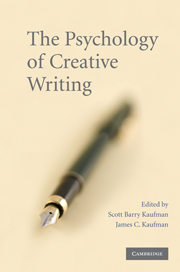Book contents
- Frontmatter
- Contents
- Contributors
- Foreword
- Preface
- Acknowledgments
- PART I THE WRITER
- PART II THE TEXT
- 6 The Evolution of Creative Writing
- 7 Literary Creativity and Physiognomy: Expressiveness in Writers, Readers, and Literature
- 8 The Literary Genius of William Shakespeare: Empirical Studies of His Dramatic and Poetic Creativity
- PART III THE PROCESS
- PART IV THE DEVELOPMENT
- PART V THE EDUCATION
- Index
- References
7 - Literary Creativity and Physiognomy: Expressiveness in Writers, Readers, and Literature
Published online by Cambridge University Press: 25 January 2010
- Frontmatter
- Contents
- Contributors
- Foreword
- Preface
- Acknowledgments
- PART I THE WRITER
- PART II THE TEXT
- 6 The Evolution of Creative Writing
- 7 Literary Creativity and Physiognomy: Expressiveness in Writers, Readers, and Literature
- 8 The Literary Genius of William Shakespeare: Empirical Studies of His Dramatic and Poetic Creativity
- PART III THE PROCESS
- PART IV THE DEVELOPMENT
- PART V THE EDUCATION
- Index
- References
Summary
Psychology views the rather unusual phenomenon of physiognomy somewhat warily if not disparagingly (Lindauer, 1984a). To justify my coverage of this controversial (and misunderstood) topic and to validate its inclusion in a discussion of literary creativity, I digress at the outset to explain my focus on the creative literary work – the literary stimulus, “the word” – rather than, as is often the case, the creative author (Lindauer, 1984c). The stage is further set with examples that clarify the complex nature of physiognomy, followed by a brief coverage of related definitional matters, methods of study, history, and theory. After these preliminary yet important considerations, I turn to the main focus of this chapter, the role of physiognomy in literature, but not before setting it within its larger place in the arts generally. Following my argument that physiognomy not only bears on literary works but also on creative authors and receptive readers, I conclude with some suggested studies.
PRELIMINARY MATTERS: SETTING THE STAGE
The Creativity of the Work
The creativity of writers – or for that matter anyone who is creative – is not just about particular individuals and such personal matters as the role of childhood experiences, family relationships, and emotional conflicts. It also depends, in the specific case of authors, on the judgments of readers (experts, critics, reviewers, the public) and the nature of the literary work (imagery and metaphors, characterization and plot development, stylistic features, use of language).
- Type
- Chapter
- Information
- The Psychology of Creative Writing , pp. 117 - 130Publisher: Cambridge University PressPrint publication year: 2009
References
- 2
- Cited by

